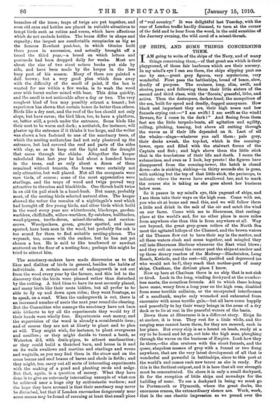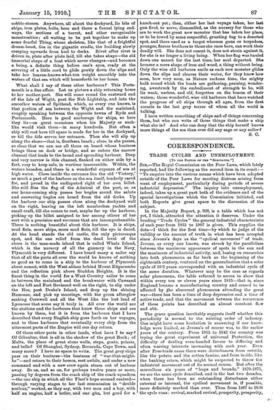OF SHIPS, AND SOME THINGS CONCERNING THEM.
ir AM going to write of the ships of the Navy, and of many things concerning them,—of that great sea which is their playground, of those fair harbours which are their nursery. In my mind's eye I can see them, the ships slipping past me one by one,—great grey figures, very mysterious, very wonderful. First pass the battleships, broad of beam, slow, deadly of purpose. The cruisers, long, slim, swift, and elusive, pass ; and following them their little sisters of the second and third class, with the' Scouts,' graceful, lithe, and active. Then the destroyers, darker-hued, the mosquitoes of the sea, built for speed and deadly, dogged annoyance. How black and important they are, their high noses and low funnels crying out:—" I am swift I am swift as the wind! Beware, for I come in the dark !" And fleeing from them fast are the little torpedo-boats, all agitation and agility, rolling, pitching, tossing, but above all cutting through the waves as if their life depended on it. Last of all the whales—slugs—whatever you call them: pale grey, their decks awash, the top-hat, which is the conning- tower, open and filled with the stalwart forms of the Captain and Sub ; and high above them the little stick that is the touchstone of their life and death. I mean the submarines, and even as I look, hey presto ! the figures have disappeared from the conning-tower, the hatch is closed down—she is sinking, sinking—in thirty seconds she is gone, with nothing but the top of that little stick, the periscope, to indicate where the waves have swallowed her, and to mark the course she is taking as she goes about her business below seas.
So it passes in my mind's eye, this pageant of ships, and I see them take their ways on the high seas. Come with me, you who sit at home and read this, and we will follow them a little and drink in the salt of the air and catch the wind on our faces. Come with me to Sheerness, that resting- place at the world's end, for no other place is more miles from anywhere else than this is from anywhere at all. Way out beyond, the great grey-green rollers of the North Sea meet the agitated lollops of the Channel, and the brown waters of the Thames flow out to have their say in the matter, and all these waters clash and come together, and mingled they roll into Sheerness Harbour whenever the East wind blows ; and they roll on round the corner past the ships at anchor and up those dreary reaches of the Medway—Blackstakes, Long Reach, Kethole, and the rest—till, pacified and depressed (as who would not be P), they reach that mother-port of many ships, Chatham, the dirtiest place I know.
Now up here at Chatham there is no ship that is not sick or tired. Look in the long, winding dockyard at the number- less masts, the countless funnels. All to which these belong have come, weary from a long year on the high seas, disabled from some terrible collision, or the unexpected interference of a sandbank, maybe only wrenched and exhausted from encounter with some terrific gale,—but all have come happily and peacefully to lay their weary beings in the arms of a dry dock or to lie at rest in the peaceful waters of the basin.
Down there at Sheerness it is a different story. Ships lie at anchor, it is true. They rest for a little while, and the surging seas cannot harm them, for they are moored, each in her place. But every ship is as a hound on leash, ready at a cry to be loosed and let go, out into the high seas, ploughing through the waves on the business of Empire. Look how they lie there,—the slim cruisers with the short funnels, and the queer, shapeless masses of grey with a funnel or two flung anywhere, that are the very latest development of all that is wonderful and powerful in battleships, since to this port at the world's end comes each new terror as she is ready. For this is the furthest outpost, and it is here that all our strength must be concentrated. On shore it is only a small dockyard, fit for the reception of little ships and nowadays for the building of none. To see a dockyard in being we must go to Portsmouth or Plymouth, where the great docks, the enormous cranes, the extraordinary shears are. Work, work, that is the one chaotic impression as we pound over the cobble-stones. Anywhere, all about the dockyard, lie bits of ships, iron plates, bolts, here and there a funnel lying end- ways, the sections of a turret, and other recognisable monstrosities ; all waiting to be put together to make up some fearful Thing, whose skeleton, like that of a frightful dream-beast, lies in the gigantic cradle, the building slowly creeping upwards from keel to decks. Rivet after rivet is driven in, plate after plate laid, till she takes shape—the old immortal shape of a boat which never changes—and becomes a being, a definite thing before one's eyes, ready at the severing of a little cord to glide gently down the slips and take her heaven-lmows-what-ton weight smoothly into the waters of that sea which will henceforth be her home.
What shall I say of these other harbours P This Ports- mouth is a fine affair. Let us picture a ship returning home to her mother-port. She will come round the eastward end of the Isle of Wight, past the Nab Lightship, and into the smoother waters of Spithead, which, as every one knows, is that portion of sea between the Wight and the mainland, roughly speaking between the opposite towns of Ryde and Portsmouth. Here is good anchorage for ships, so here they lie—on great occasions when his Majesty or such- like would visit them—in many hundreds. But often a ship will rest here till space is made for her in the dockyard, or till the tide serves her entrance. Then she will slip up along the shore—that is, Sonthsea beach ; close in she passes, so close that we can see all those on board whose business brings them on deck or bridge, and so enters the narrow channel that leads to the broad and spreading harbour. Deep and very narrow is this channel, flanked on either side by a fort, easy to keep safe, in wartime inaccessible. Within, the waters broaden, and there is a wonderful expanse of sea at high water. Close inside the entrance lies the old Victory,' as much a part of the harbour as the sea itself, tenderly eared for, and proud in the undisputed right of her own billet. She still flies the flag of the Admiral of the port, so as our home-coming ship passes her bugles sound the salute and answering bugles are heard from the old decks. Up the harbour our ship passes close along the dockyard wall on the right, leaving on the left numberless yachts and small craft, till she comes to rest, maybe far up the harbour, picking up the billet assigned to her among others of her sort with a precision and sureness that are incomprehensible. There is nothing beautiful about this harbour. It is ships, mud flats, more ships, more mud flats, till the eye is dazed. At the head stands the old castle, the only picturesque spot, and the one relief from the dead level of the shore is the man-made island that is called Whale Island, which is the nursery of all the gunnery in the Navy, Plymouth is very different. I have heard many a sailor say that of all the ports all over the world he knows of nothing so good as to come in a ship to the harbour of Plymouth about sunset, with the West ablaze behind Mount Edgecumbe and the reflection pink above Staddon Heights. It is the finest thing in the world for a West Country sailor to come in between the mainland and the breakwater with Cawsand on the left and Fort Bovisand well on the right, to slip under the Hoe, past Drake's Island, and drop up the shining Hamoaze, and pick up moorings, with the green afterglow making Cornwall and all the West like the lost land of Lyonesse that some say it truly is. All over the world are the stations and the harbours that know these ships and are known by them, but it is from the harbours that I have described that every English ship goes forth on her voyages, and to these harbours that eventually every ship from the uttermost parts of the Empire will one day return.
Of those other ports in other lands, what have I to say P Of Gibraltar, that is all in the shadow of the great Rock; of Malta, the place of great stone walls, steps, goats, priests, and bells P Of Shanghai, Sydney, Bermuda, Cape Town, and many more ? I have no space to write. The great grey ships pass on their business—the business of " war-that-might- be "—and return to their homes, rest awhile, and under a new command and with a new crew again steam out of harbour away. So on, and so on, for perhaps twelve years or more, passing by degrees from the crack ship of the crack squadron —the one ship in which all the Fleet's hope seemed centred— through varying stages to her last commission in "double nueleus," worked, as they say, with two men- and a boy, with -half an Migitie; half a" belief, 0110 ,gfin., but good for a knock-out yet; then, either her last voyage taken, her last gun fired, to serve, dismantled, as the nursery for those who are to work the great new monster that has taken her place, or to be towed by some respectful, grunting tag to a deserted spot, and there used as a target whereon guns or torpedoes, younger, fiercer brothers to those she once bore, can work their deadly will. She does not resent it, does not strain against it, for she is no longer a living being. When her flag was hauled down one sunset for the last time, her soul departed. She became a mere shape of iron and wood, a thing without being. Only the wise old harbours smile as each new monster glides down the slips and cleaves their water, for they know how soon, how very soon, as Nature reckons time, the mighty hulk round which the boats are gathering, praising, wonder- ng, awestruck by the embodiment of strength to be, will lie weak, useless, and old, forgotten on the bosom of their waters; those wonderful, wise old harbours that have watched the progress of all ships through all ages, from the first coracle to the last grey terror of whom all the world is talking.
I have written something of ships and of things concerning them, but who can write of those things that make a ship what she is ? And who can deny that the ship herself knows more things of the sea than ever did any sage or any sailor P
S. 0.







































 Previous page
Previous page